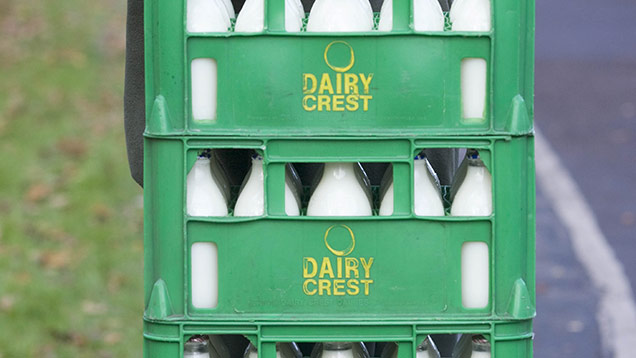Dairy Crest sale to Muller: 5 things we know and 5 we don’t

Dairy Crest’s £80m sale of its liquid milk business to competitor Muller Wiseman is one of the biggest shake-ups the sector has had for a while.
About 700 farmers will be switched over as part of the deal and the Big Four processors will become the Big Three, as Dairy Crest is stripped back to its cheese and baby formula businesses.
First, however, competition authorities will have to consider the sale – a process that could take up to a year.
In the meantime, plenty of questions remain about what this means for farmers and the future of British dairying.
Five things we know:
- For now, it’s business as usual. Until competition approval is granted, Dairy Crest farmers will remain Dairy Crest farmers. Muller Wiseman and Dairy Crest will stay competitors in the liquid milk market. This raises the intriguing prospect of the businesses competing in the ongoing tender to supply Morrisons’ milk.
- Farmers have been promised their contracts are safe. On the morning of the deal, letters went out from both Dairy Crest and Muller to the affected producers, introducing the new business and explaining that their contracts are safe. In the NFU’s response to the news, NFU dairy board chairman Rob Harrison said he had been assured this was the case.
- Dairy Crest will be a smaller, more profitable business if the deal goes ahead. The dairies business was the weak link, returning a £4m loss in six months to 30 September. What’s left are market-leading brands such as Cathedral City, Davidstow and Clover and Dairy Crest is investing heavily in high-value baby formula ingredients aimed at the Chinese market.
- Arla and Muller Wiseman will be in pole position. Dairy Crest will be left with about 400 suppliers, placing it among the middle tier processors such as Meadow Foods. First Milk might have 1,800 members at the last count but its focus is on cheese and added-value products. Only Muller and Arla – with 1,900 and 3,000 farmers each – have the scale to be able to bid for the biggest supermarket liquid contracts.
- This means some value could come back into liquid milk. The supermarket price war since the spring has forced four-pint retail prices down to £1 or less. Half of British milk ends up bottled on the shelf but supermarkets lose money on it, processors make a minuscule margin and more pressure is put on the farmgate. With just two of them left, Arla and Muller could have more bargaining power against the cost-cutting retailers. Also they both have plans to develop more higher-value, branded liquid products.
Five things we don’t know:
- What will happen to those “safe” contracts in the long term? Muller has said the combined business will offer farmers competitively priced, voluntary code-compliant contracts. But the fact is, Muller is a highly efficient, private company that will have to assess how its expanded pool fits its business needs. Guarantee or not, farmers will still face uncertainty.
- What happens to suppliers’ group Dairy Crest Direct? The 1,100-strong, independently funded body has been a leader in representing its farmers’ interests as well as running innovative schemes such as the transparent pricing formula. DCD can still look after the 400 Davidstow producers. But will the other 700 have to accept the representation of Muller’s farmer board, or could a new, independent group be set up?
- Is two liquid milk giants better for farmers? It depends on the situation. When production is high and farmers need strong sellers around the supermarket table, two voices have to be better than three or four. But when supplies are not so high and there’s greater demand, the competition for recruitment – like we saw early this year – might not push up farmgate prices to the same degree.
- What’s the future for dedicated, supermarket supply schemes? The premium Arla Tesco and Sainsbury’s suppliers receive is spread out across all the co-op’s members. This means it will just be Muller farmers receiving those gold-plated retailer prices with Tesco, Sainsbury’s, The Co-op, Waitrose and M&S. Combined with the two processors’ extra clout in negotiations, could there be a change of tack the next time a renewal rolls round?
- Will the deal get approval? The competition authorities will take months to make a decision and their main customers, the supermarkets, might not be keen on such consolidation. Dairy Crest and Muller are confident but there has been some muttered scepticism. If it didn’t go through, would Dairy Crest want to hang on to a loss-making dairiy business? And would anyone else want to buy it?
See more
